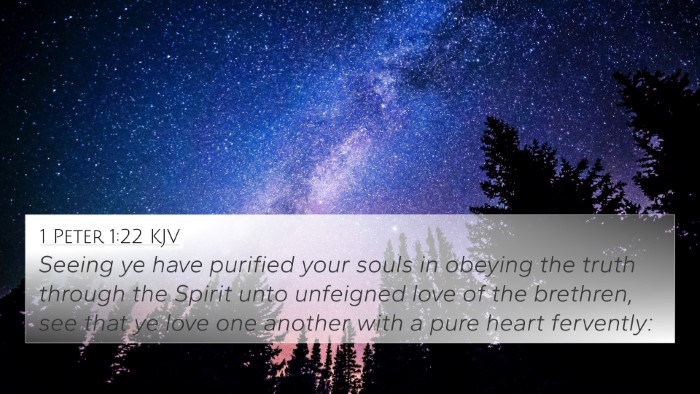Colossians 1:8 reads, "And who also declared to us your love in the Spirit."
In this verse, the Apostle Paul expresses gratitude for the Colossians' faith and love, identifying the source as the working of the Holy Spirit in their lives. It serves as a reminder of the transformative power of divine love and its manifestation through spiritual gifts.
Summary of Colossians 1:8
The essence of this verse focuses on two primary themes: love and the Holy Spirit. Paul indicates that a significant part of Christian faith is grounded in love, which comes from the Spirit. This love evidently impacts not only the believers themselves but is also recognized by others, showing a community living in alignment with God’s will.
Commentary Insights
Matthew Henry emphasizes the love displayed by the Colossians: it is not merely an emotion but an active, Spirit-filled principle that shapes their interactions and behaviors. This love is a reflection of their relationship with God and represents the fruit of the Spirit (Galatians 5:22-23).
Albert Barnes elaborates on how this love is both a testimony to their Christian character and a source of encouragement for Paul. The acknowledgment of their love illustrates the work of the Holy Spirit in converting and nurturing them in their faith.
Adam Clarke notes that the "love in the Spirit" indicates a unity among believers stemming from their shared experience in Christ. He reinforces that love is a fundamental aspect of Christian fellowship, which generates mutual support and encouragement among the early Christian communities.
Bible Verse Cross-References
- Galatians 5:22-23: The fruit of the Spirit, emphasizing love as a key attribute.
- 1 Corinthians 13:4-7: A description of love's characteristics and its essential nature in Christian life.
- Romans 5:5: God's love being poured into our hearts through the Holy Spirit.
- Ephesians 4:3: The call to maintain the unity of the Spirit through the bond of peace.
- 1 John 4:7-8: The command to love one another, as love is from God.
- Philippians 1:9-10: Paul's prayer for their love to abound more and more in knowledge and discernment.
- 1 Thessalonians 4:9: The message that they have been taught by God to love one another.
- 2 Timothy 1:7: God gives us a spirit of power, love, and self-control.
- John 13:34-35: A new commandment to love one another as Jesus has loved us, so that all will know we are His disciples.
- Colossians 3:14: Emphasizing love as the bond of perfectness and unity among believers.
Thematic Bible Verse Connections
The connection between Colossians 1:8 and other scriptures can best be seen through the lens of love in action. The emphasis on love unites various aspects of Christian teaching, linking the sentiments of Colossians with those of Galatians and Romans where Paul often references love as a central pillar.
This highlights the inter-Biblical dialogue present in Scripture, wherein the teachings of the Old Testament prophets about love and compassion find reflections in the teachings of the Apostle Paul, bridging the gap between various Biblical texts. The concordance of these themes serves as an invitation for a deeper exploration of how love is a galvanizing force among followers of Christ.
Comparative Bible Verse Analysis
When analyzing Colossians 1:8 with 1 John 4:7-8 and Galatians 5:22-23, one can see a vivid illustration of the essence of Christian relationships. Each verse expands upon the necessity of love among believers:
- 1 John 4:7-8: Addresses the divine origin of love and mandates its practice among believers.
- Galatians 5:22-23: Identifies love as a fruit of the Spirit, essential to Christian conduct.
Such comparative studies enhance our understanding of the New Testament’s message: that love, nurtured by the Holy Spirit, is foundational to genuine faith. This harmonizes with Paul’s intent in Colossians, reminding readers of the interdependence in Christian communities through shared love.
Conclusion
Colossians 1:8 encapsulates the essence of the Christian life — love that is born out of the Holy Spirit’s work within believers. This verse serves as a powerful reminder that love is more than an emotion; it is an active force that should manifest in relationships, evidencing the transformative power of God in our lives.








